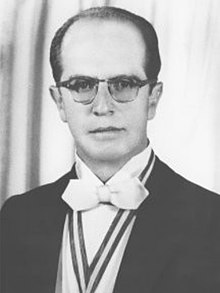Luis Adolfo Siles
Luis Adolfo Siles | |
|---|---|
 | |
| 49th President of Bolivia | |
| In office 27 April 1969 – 26 September 1969 | |
| Vice President | Vacant |
| Preceded by | René Barrientos |
| Succeeded by | Alfredo Ovando Candía |
| 31st Vice President of Bolivia | |
| In office 6 August 1966 – 27 April 1969 | |
| President | René Barrientos |
| Preceded by | René Barrientos |
| Succeeded by | Jaime Paz Zamora |
| Personal details | |
| Born | Luis Adolfo Siles Salinas (1925-06-21)21 June 1925 La Paz, Bolivia |
| Died | 19 October 2005(2005-10-19) (aged 80) La Paz, Bolivia |
| Political party | Offensive of the Democratic Left 1978–1980 Social Democratic (1944–1978) |
| Other political affiliations | Democratic Revolutionary Front–New Alternative (political coalition, 1980) Front of the Bolivian Revolution (political coalition, 1966) |
| Spouse | Clemencia Santa Cruz |
| Relations | Hernán Siles Zuazo (half-brother) Jorge Siles Salinas (brother) |
| Children |
|
| Parent(s) | Hernando Siles Reyes Luisa Salinas Vega |
| Education | University of Saint Francis Xavier |
| Awards |  Order of the Sun of Peru Order of the Sun of Peru Order of Isabella the Catholic Order of Isabella the Catholic Order of Civil Merit Order of Civil Merit |
| Signature |  |
Luis Adolfo Siles Salinas (21 June 1925 – 19 October 2005)[1] was a Bolivian politician who served as the 49th president of Bolivia in 1969 and as the 31st vice president of Bolivia from 1966 to 1969.
Background and early life
Born in La Paz, Luis Adolfo Siles was the son of former president Hernando Siles Reyes (1926–1930) and half-brother of another famous Bolivian politician and two-time president, Hernán Siles Zuazo (1956–1960 and 1982–1985). Educated as a lawyer in his native country, he also obtained a doctorate in Spain. Siles eventually joined the small Partido Demócrata Cristiano (Christian-Democrat Party), which supported René Barrientos in the 1966 elections. Eisenhower Fellowships selected Luis Adolfo Siles in 1955 to represent Bolivia.
Vice President of Bolivia
In fact, Siles ran as General Barrientos' vice-presidential running mate, and was sworn-in in that capacity after their ticket prevailed at the polls.[2]
President of Bolivia
Siles became president when Barrientos was killed in a helicopter crash near Arque, Cochabamba, on 27 April 1969.
The Siles presidency was short and marred by disagreements with the powerful Commander of the Armed Forces, General Alfredo Ovando. The latter harbored ambitions to become president in 1970, when he was projected to run as Barrientos' successor. But Ovando's disagreements with Barrientos on a number of important issues during the 1967–69 period had displeased many die-hard Barrientos followers, including Vice-president Siles. For these reasons, in addition to resentment over the constant meddling by Ovando, Siles seemed to be throwing his support behind the surprise candidacy of the Mayor of La Paz, Armando Escobar Uría, as the true heir and successor to Barrientos (Bolivian laws did not allow direct re-election of a sitting president). This threatened to spoil General Ovando's carefully laid plans.
Overthrown by a coup d'état
In the end General Ovando decided not to wait for the elections and instead launched a coup d'état on 26 September 1969, overthrowing Siles and with him, what was left of Bolivian democracy (or its appearances, in any case).
Later years
Returning to Bolivia during the dictatorship of Hugo Banzer (1971–78), Siles played a prominent role as a defender of human rights. He ran for president in 1980, but failed to garner much support. Despite leading a relatively small party, Siles vociferously opposed the 1980-81 dictatorship of Luis García Meza.
Death
Respected for his steadfast stance in defense of democratic principles, Siles died on 19 October 2005 in La Paz.
References
- ^ "Obituary: Luis Adolfo Siles". The Guardian. 20 October 2005. Retrieved 2 January 2020.
- ^ Vicepresidency of Bolivia Archived 16 April 2009 at the Wayback Machine
- v
- t
- e
 Category
Category List
List












